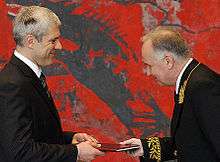Diplomatic accreditation

Diplomatic accreditation is the process in which an ambassador is certified as one country's official representative to another.
Accreditation occurs when a new ambassador presents "letters of credence", or diplomatic credentials, to the host country's head of state. Letters of credence, which are signed by the ambassador's own head of state, confirm that the ambassador is authorised to represent his or her country, and ask that the host country respect this fact. The presentation of letters of credence is often an elaborate ceremony, and serves as an official welcome to the new ambassador.
In accordance with the Vienna Convention on Diplomatic Relations, ambassadors are not regarded as having officially taken up their duties until the accreditation process is complete. Among the diplomats accredited to a particular country (the diplomatic corps), seniority is determined by the date of accreditation.
Usually, an ambassador is accredited to only one country at a time, but this is not always the case — multiple accreditations (often called dual accreditations or cross-accreditations) are possible. In this case, ambassadors live in one country, and travel to the others as required. This allows a country to have full diplomatic relations with a country even if maintaining a resident ambassador is not necessary or is an inefficient use of resources.